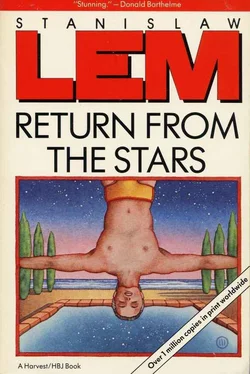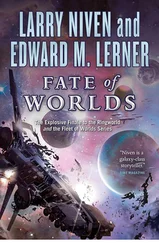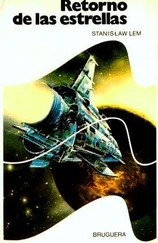The university complex stood outside the city. My ulder landed in a huge park, on a concrete platform. Only the pale silver glow across the sky, above the blank wall of trees, showed the proximity of the city. A long avenue led to the main building, which was dark, as though deserted.
No sooner did I open the huge door than the interior was flooded with light. I found myself in a vaulted hall with pale blue tiles. A network of soundproof passages took me to a corridor, plain and austere — I opened one door, then another, but the rooms were all empty, as if the people had departed long ago. I went upstairs, up a flight of real stairs. There must have been an elevator somewhere, but I didn’t feel like looking for it. Besides, stairs that didn’t move were a novelty. At the top, heading in both directions, was another corridor with vacant rooms; on the door of one I saw a small piece of paper with the words “In here, Bregg.” I knocked, and heard the voice of Thurber.
I went in. He was sitting hunched in the light of a low-hanging lamp. Behind him was the darkness of a wall-to-wall window. The desk at which he worked was littered with papers and books — real books — and on another, smaller, desk nearby lay entire handfuls of those crystal “grains of corn” plus various pieces of equipment. In front of him he had a stack of paper and with a pen — a fountain pen! — he was making notes in the margins.
“Have a seat,” he said, not looking up. “I’ll be done in a minute.”
I took a low chair by the desk but immediately moved it to the side, because the light made a blur of his face and I wanted to get a good look at him.
He worked in his characteristic way, slowly, frowning into the glare of the lamp. This was one of the simplest rooms I had seen so far, with dull walls, an old door, no decoration, and none of that tiresome gold. On either side of the door was a square, blank screen, and the wall near the window was filled with metal cabinets; rolls of maps or technical drawings leaned against one of these — that was all. I considered Thurber. Bald, solidly built, heavy; he was writing, now and then would wipe his eyes with the edge of his hand. They were always watering. Gimma (who liked to reveal others’ secrets, especially those that a person tried hardest to keep hidden) once told me that Thurber was afraid of going blind. Which explained why he was always the first to turn in when we changed acceleration, and why — in later years — he let others do things for him that he had once insisted on doing himself.
He gathered the papers with both hands, tapped the desk with them to get the edges even, then put them in a briefcase, closed it, and only then, lowering his large hands with those thick fingers that looked as though they had difficulty bending, said:
“Welcome, Hal. How goes it?”
“I’m not complaining. Are you… alone?”
“You mean is Gimma here? No, he isn’t; he left yesterday. For Europe.”
“You’re working… ?”
“Yes.”
There was a pause. I didn’t know how he would take what I had to say to him — I wanted first to find out what he thought of this world that we had come to. True, knowing him, I didn’t expect a flood of words. He kept most of his opinions to himself.
“Have you been here long?”
“Bregg,” he said, without moving, “I doubt that that interests you. You’re stalling.”
“Possibly,” I said. “Then I’m to say what’s on my mind?”
I was beginning to feel again that awkwardness, something between irritation and shyness, that always came over me in his presence. I suspect the others felt the same thing. You never knew when he was joking and when he was being serious; for all his composure, the attention that he gave you, he was hard to figure out.
“No,” he said. “Perhaps later. Where did you come from?”
“Houl.”
“Directly?”
“Yes… why do you ask?”
“That is good,” he said, as if he hadn’t heard my question. He looked at me for maybe five seconds without moving, as if wanting to make sure of my presence. His expression said nothing — but I knew, now, that something had happened. But would he tell me? He was unpredictable. While I wondered how I ought to begin, he studied me carefully, as though I had appeared before him in some unfamiliar form.
“What’s Vabach doing?” I asked, when this silent scrutiny got to be too much.
“He went with Gimma.”
That was not what I meant, and he knew it, but, then, I hadn’t come to ask about Vabach. Again, a silence. I was beginning to regret my decision.
“I hear that you got married,” he said suddenly, almost carelessly.
“Yes,” I said, perhaps too dryly.
“It’s done you good.”
I searched for something else to talk about. Apart from Olaf, nothing came to mind, but I didn’t want to ask about him yet. I was afraid of Thurber’s smile — the way he used to demolish Gimma with it, and not only Gimma — but he only raised his brows a little and asked:
“What plans do you have?”
“None,” I replied, and it was the truth.
“And would you like to do something?”
“Yes. But not just anything.”
“You haven’t done anything so far?”
I was definitely blushing now. I was angry.
“Nothing. Thurber… I didn’t come here to talk about myself.”
“I know,” he said quietly. “It’s Staave, isn’t it?”
“Yes.”
“There was a certain element of risk in this,” he said, pushing himself gently away from the desk. His chair obediently turned toward me.
“Oswamm feared the worst, especially later, when Staave threw away his hypnagog… You did, too, didn’t you?”
“Oswamm?” I said. “Which Oswamm? Wait — the one from Adapt?”
“Yes. He was worried most about Staave. I pointed out to him his error.”
“What do you mean?”
“But Gimma vouched for both of you…” he concluded, as though he had not heard me.
“What?” I said, rising from the chair. “Gimma?”
“Of course, he knew nothing,” Thurber went on, “and told me so.”
“Then why the hell did he vouch for us?” I burst out, confounded.
“He felt that he had to,” Thurber explained laconically. “That the director of an expedition should know his men…”
“Nonsense.”
“I’m only repeating what he said to Oswamm.”
“Yes?” I said. “And what was Oswamm afraid of? That we would mutiny?”
“You never had the urge?” Thurber asked quietly.
I reflected.
“No,” I said finally. “Never seriously.”
“And you’ll let your children be betrizated?”
“And you?” I asked slowly.
He smiled for the first time, twitching his bloodless lips. He said nothing.
“Listen, Thurber… you remember that evening, after the last flight over Beta… when I told you…”
He nodded indifferently. Suddenly my calm vanished.
“I did not tell you everything then, you know. We were all there together, but not on an equal footing. I took orders from the two of you — you and Gimma — I wanted it that way. We all did. Venturi, Thomas, Ennesson, and Arder, who didn’t get a reserve tank because Gimma was saving it for a rainy day. Fine. Only what gives you the right now to speak to me as though you had been sitting in that chair the whole time? You were the one who sent Arder down on Kereneia in the name of science, Thurber, and I pulled him out in the name of his poor ass, and we returned, and now it turns out that the ass is the thing that counts, the other doesn’t. So maybe now I should be asking you how you feel and vouching for you, not the other way around? What do you think? I know what you think. You brought back a pile of facts and you can bury yourself in them to the end of your days, knowing that none of these polite people will ask, ‘What did this spectral analysis cost? One man, two men? Wouldn’t you say, Professor Thurber, that the price was a bit high?’ No one will say that to you because they do not keep accounts with us. But Venturi does. And Arder, and Ennesson. And Thomas. What will you use for payment, Thurber? Setting Oswamm straight about me? And Gimma — vouching for Olaf and me? The first time I saw you, you were doing the same thing you are doing today. That was in Apprenous. You sat in the midst of your papers and stared, like now: taking a break from more important matters, in the name of science…”
Читать дальше











